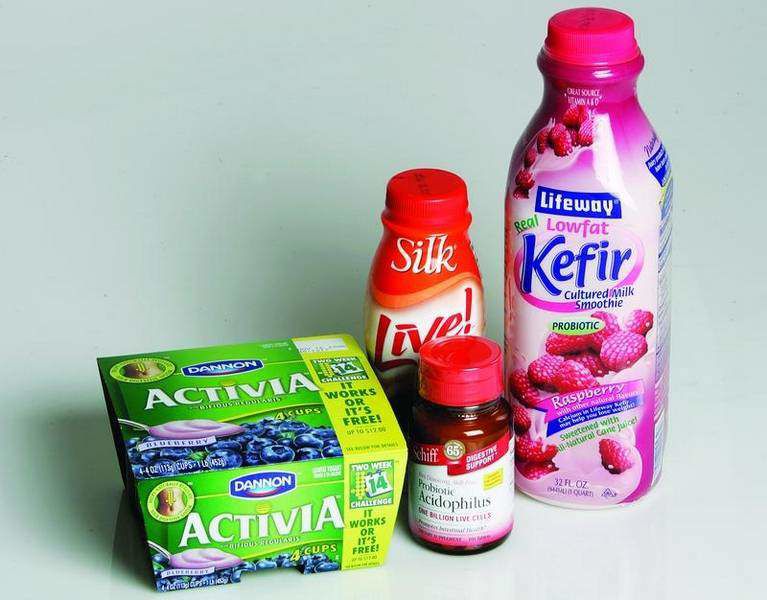Probiotics – or healthy bacteria – are the next frontier in nutrition
Published 4:00 am Thursday, November 2, 2006

- Many products that contain probiotics can be foundin local stores.
Feeling ill? Try a spoonful of bacteria.
While the thought of swallowing a mouthful of living, writhing bacteria might be enough to turn most stomachs, scientists are discovering that adding some microbes to your diet might have far-reaching health benefits.
Healthy bacteria, known as probiotics, are the next frontier in nutrition and medicine, but it’s not as revolutionary as it might seem. People have been eating live active cultures in yogurts or fermented dairy products, such as kefir, for years and reaping the digestive benefits. The Nobel Prize-winning Russian scientist Elie Metchnikoff proposed in 1907 that eating certain types of bacteria could be good for you. But it’s taken nearly 100 years for science to prove it.
According to a report issued this summer by the American Society for Microbiology, probiotics are now being tested as treatments for gastrointestinal problems, including irritable bowel syndrome and inflammatory bowel disease; oral diseases, like tooth decay and periodontal disease; and various other conditions, including cancer and heart disease.
”Probiotics could also conceivably be put to use in preventing disease or thwarting autoimmune disorders,” says Dr. Richard Walker, a Food and Drug Administration scientist who co-chaired the committee writing the report.
”A number of these possibilities are being explored in research labs and hospitals around the world.”
”A number of these possibilities are being explored in research labs and hospitals around the world,” Walker said.
The digestive tract relies on these healthy bacteria. Consuming probiotics serves to add to the body’s natural supply.
Probiotics help reinforce the bacterial barrier that exists on the lining of the digestive tract, providing additional protection against foreign bacteria that can cause illness.
The microbes can also work by a means known as ”competitive exclusion” in which healthy bacteria compete directly with disease-causing bacteria for food and other resources, eventually crowding them out. Or probiotics might simply strengthen the immune system, allowing the body’s own defense system to be more effective at fighting disease. Research is now focusing on matching individual strains of bacteria with particular benefits.
”Only in the last 30 years have we been able to identify about a dozen bacteria that can be linked to specific ailments,” says Dr. Manfred Kroger, a professor emeritus of food science at Pennsylvania State University.
Matching game
Several studies have shown probiotics to be useful in fighting diarrhea caused by rotaviruses, the No. 1 source of gastrointestinal illness. Others are investigating whether they can colonize the mouth with healthy bacteria to crowd out the bacteria that cause gum disease and cavities. They’ve shown promise in preventing bladder cancer, urinary tract infections and atopic eczema. And researchers predict they could be useful in combating other bacterial infections, such as gastric ulcers caused by Helicobacter pylori.
It is in the arena of digestive health that probiotics have made their greatest impression so far. A study published in the British Medical Journal in 2002 found that the yeast S. boulardii and three strains of Lactobacillus, commonly found in yogurt, helped to prevent antibiotic-associated diarrhea.
Since antibiotics commonly kill not only the bad bacteria but the good bacteria in the digestive tract, they can lead to diarrhea. Doctors now routinely advise patients taking antibiotics to eat yogurt with active Lactobacillus cultures to replace those healthy microbes.
”For some of the links to health or disease, we still need further evidence, such as cancer, heart disease or improvement of the immune system,” Kroger says. ”But it is now undisputed that many of these lactic acid bacteria help with lactose intolerance, shorten – even prevent – bouts of food poisoning and generally produce intestinal flora conducive to well-being. As old-timers used to say, ‘You are only as healthy as your gut.’”
Preventive health
There may be more truth to that than meets the eye. Researchers in Sweden found that adding probiotics to the diet of factory workers reduced sick days by 60 percent.
The workers were randomly assigned to receive a drink with or without Lactobacillus reuteri, every day for 80 days. Over the course of the study, 23 of the 87 workers drinking a regular drink called in sick at least once. But only 10 of the 94 workers taking the probiotic drink took a sick day during the study period.
The effect was even stronger among shift workers, where one-third of those on placebo missed work due to illness, but not a single worker taking probiotics called in sick.
Although the precise mechanism by which the bacteria prevented illness was unclear, the researchers suggested the probiotic may work by stimulating the immune system.
”This stimulation may also explain why the beneficial effect of L. reuteri in our study was specifically apparent among shift-workers,” the authors wrote. ”Shift-workers are known to be at risk for having a weaker immuno-defense as compared to those working day-time shifts only.”
Some experts believe higher levels of Bifidobacteria in the digestive system of breast-fed infants may be one reason why they are generally healthier than formula-fed babies. And last year, researchers were able to cut the incidence of gastrointestinal illnesses and fevers in babies attending day care by adding the probiotic Lactobacillus reuteri to infant formula.
Help for autism
One of the more intriguing uses of probiotics was to help children with autistic spectrum disorders. Autistic children often experience severe dietary and gastrointestinal problems, including abdominal pain, constipation, diarrhea and bloating. Researchers from the University of Reading, in the U.K., recently discovered that children with autism often have a vastly different makeup of bacteria in their digestive system, containing more of the bacteria Clostridium histolyticum.
They then recruited families with autistic children to test whether a probiotic, a non-commercial strain of Lactobacillus plantarum, could help reduce levels of the bacteria and improve symptoms. The children would each get a probiotic or a placebo in the first half of the study, then switch to the other at the midpoint.
But in the early stages of the study, the parents of three of the 22 children in the study noticed a profound change in their children’s autistic behavior. The change was so dramatic they refused to switch to the other pill at the midpoint.
”Whilst they assumed that this had been the probiotic, they said they didn’t care whether it was the probiotic or the placebo,” Dr. Anne McCartney, the lead author of the study, said in an e-mail. ”They had seen an improvement and simply wanted more of whatever it was that had elicited said behavioral improvement.”
But McCartney says all three had received the probiotic first. The researchers are in the process of preparing the study for publication but realize the finding is likely to create much excitement among parents.
”Parents and guardians of autistic children are generally very keen to identify avenues to improve the quality of life of their child,” she says. ”Our understanding of the gastrointestinal microbiota and gut function in autistic individuals is very much in it is infancy. However, it is clearly an area of worthwhile pursuit.”
The researchers used a version of the probiotic developed by Swedish biotech firm Probi. The probiotic was marketed briefly in Europe in a nondairy fruit drink called ProViva SHOT!, but the product is no longer in stores. The probiotic is available in the U.S. through a licensing agreement with the distributor Healthy Directions through the DrSinatra.com Web site. The Danone Group, the international parent company that owns the Dannon brand, is also developing products using Probi’s Lactobacillus plantarum, but none are on the market yet.
In local stores
Probiotics also hold promise because, unlike prescription drugs, they are naturally found in humans and are known to be safe.
”Numerous clinical studies have been conducted around the world, particularly over the last 15 years, and by far the most remarkable finding to date is that none of them have identified any unwanted or harmful side effects on people’s health,” says Dr. Jacques Goulet, a professor in the Department of Food Sciences and Nutrition at Laval University.
And unlike pharmaceuticals, you don’t need a prescription to get a probiotic. They’re stocked on the shelves of grocery stores as nutritional supplements or as ingredients in foods.
Bifidobacteria and Lactobacilli are naturally found in some dairy products, but not all bacteria in yogurt or kefir have probiotic effects. Those with active cultures list them on the container. Foods specially fortified with probiotics are much more common in Europe and Japan, but they are working their way into the U.S. market.
Earlier this year, Dannon introduced Activia, a low-fat yogurt containing Bifidus regularis. Studies funded by Dannon found that eating the yogurt for two weeks can help regulate the digestive system. The company also sells DanActive, a probiotic cultured dairy drink that the company says will naturally strengthen the body’s defenses. Breyers Light! Probiotics Plus Yogurt contains Bifidobacterium cultures, and a number of companies offer milk with Acidophilus added.
The food products generally tout better digestive health, but vendors of powdered probiotic dietary supplements claim their products can do much more. Some combinations are marketed as ways to prevent cancer, fatigue or high cholesterol. But those benefits haven’t been proved in clinical studies.
”I rarely recommend supplements to my clients, largely because they’re usually already taking a whole array or because their physician has already made such recommendations,” says Debra Burke, a nutritionist at the Mountain Laurel Center for the Healing Arts in Bend. ”I do, however, recommend probiotics over and over. I especially recommend them for people with signs of poor digestion, bad breath, parasites, diarrhea or other signs of less-than-optimal bowel function, and for those who’ve had a recent course of antibiotics.”
Burke says people sometimes have to experiment with the type of probiotic and the amount to see a result.
Probiotics are widely used as a preventive measure for livestock, such as to prevent gastrointestinal distress when switching feed types. In Europe, a prohibition against using antibiotics as livestock growth stimulators has led farmers to use probiotics therapies much more often than in the United States.
But then again, animals are generally less concerned about eating live bacteria. The American Society of Microbiology report on probiotics says the biggest obstacle to widespread use of probiotics will likely be the public’s fear of the term ”bacteria.”
”The general public, particularly in the United States, is possessed of a fear of these unseen legions,” the report says. ”Microbes are viewed by many as germs that need to be cleaned from the body and its surrounds.”







